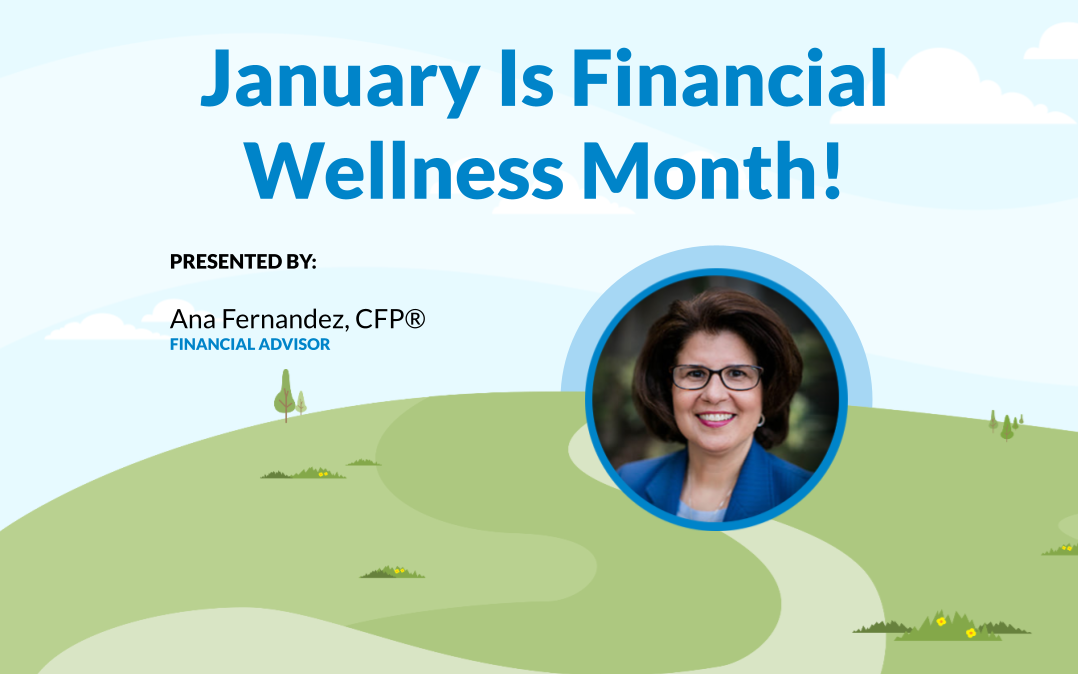The New Year is a time for making resolutions to ensure the coming year is a better one than the last. Because January is also Financial Wellness Month, we’d like to help you with the intersection of those two: creating financial wellness resolutions. Improving your financial health will have benefits not just throughout this year but that could carry on and have an impact throughout your life.
The Path to Financial Freedom
We’ve divided our financial wellness tips based on where you are on our Path to Financial Freedom, plus a bonus category for business owners. Click on your category to jump straight to the most useful tips, or keep reading if you’d like to learn them all.
Click on your category’s header to jump straight to the most useful tips for your stage on the Path to Financial Freedom.
Foundation
Building a Foundation is the earliest stage on the Path. People at this stage may have student loan debt, a mortgage, and/or consumer credit card debt. In this first stage, the focus is on building a foundation for a healthy financial future.
Formation
The second stage on our Path to Financial Freedom is Formation. People who are in this stage of the Path may be more focused on growing investments and achieving dreams, such as saving for retirement, paying off a mortgage, or funding a child’s future college education.
Freedom
Congratulations, you’ve made it! If you’re at this stage on the Path, you’ve achieved Financial Freedom, but that doesn’t mean your work is done. It’s important to sustain that hard-earned freedom and to look to the future, including what you are doing to equip future generations.
Business Owners
If you own your own business, depending on its classification, you may have unique financial needs that differ from those of an individual. Corporations, for example, may be taxed differently, at different times of the year, and have more stakeholders involved.
Do You Have Kids in College or Entering College?
This is a reminder that filed tax returns are part of the (FASFAⓇ) Free Application for Federal Student Aid application form. Completing the FASFA form allows your child to be considered for federal student aid. States and colleges use FAFSA information to award their own grants, scholarships, and loans. Aid is limited, so you must meet the deadlines!
- Prepare Tax Paperwork: File your taxes promptly for a quicker tax return.
- Complete FASFA: For more information, visit FAFSA® Application Deadlines | Federal Student Aid.
- 2023- 2024 form available
- 2024-2025 form available as of December 31, 2023
- Explore Scholarships: Search for scholarships to avoid if not reduce the reliance on student loans. A word of caution: scholarship search websites are generally supported by financial institutions that offer loans – so be cautious regarding any loan advertising they may put in front of you.
Update Your Net Worth Statement
Now is a great time to update your net worth statement by using the balances of all your accounts as of 31 December 2023. Ask yourself if your net worth statement improved compared to 2022. Net worth improves by decreasing debts and increasing assets and changes constantly, so it’s important to create an updated net worth statement (see page 3) for financial planning purposes.
Write Down Your Financial SMART Goals
Writing down SMART goals can help you plan your finances for the long term. Defining your goals this way helps you to focus on what matters most. SMART goals are:
- Specific: Make sure you are specific with your goals. Where or what will your money be going to go towards?
- Measurable: How much money are you going to start saving? Include a specific number and time frame..
- Actionable: What actions do you need to take to achieve your goals? Always attach an action to your goals.
- Realistic: Make sure your goal is realistic, and you’re passionate about it. If you don’t truly believe you can achieve this goal, you’re doomed from the start.
- Time-Bound: How much time will it take you to achieve this goal? 1 month, 6 months, 1 year. Visualize the day you achieve your goal and how accomplished you will feel.

Financial Wellness Tips for Foundation
Make a Spending Plan
Creating a spending plan is like having a financial roadmap—it provides direction, control, and a clear understanding of where your money is going. The goal is to knock out consumer debt and start saving as much as you comfortably can. Of course, if you are knocking out consumer debt, then please be mindful to not take on any new debt – nothing screams financial freedom like being consumer debt-free!
You can use page four of this document to get started. Automating essential expenses, consumer debt payments, and saving is the easiest way to build a solid foundation to start building your wealth. Stay aligned with your annual financial objectives when making purchases, and be ready to tweak your spending plan if you exceed your budget.
Build an Emergency Fund Part 1
Prepare for life’s unexpected events by taking proactive steps:
- Establish a starter emergency fund of $1,000 to cover minor unexpected expenses like flat tires or car breakdowns. According to a recent Bankrate survey, 57% of Americans can’t cover a $1,000 emergency with savings.1 This fund prevents accumulating new debt while working on eliminating existing ones.
- Focus on debt reduction by creating a game plan for eliminating car payments, credit card debt, and other outstanding balances (excluding your mortgage).
Get Rid of Your Consumer Debt (Except for Your Mortgage)
When deciding what you want to pay off, you have to keep a few things in mind. First, you must prioritize essential bills such as shelter, food, water, and electricity. Additionally, you need to avoid accumulating more debt by setting goals, creating a spending plan, and planning for the unexpected. Many find it helpful to switch spending back to cash via debit cards or physical money in order to not accidentally spend money you do not have or did not budget for. Make 2024 your debt-free year by following these steps:
- Prepare: List all your debts, starting from the smallest to the largest (e.g., Visa card – $200, Mastercard – $1,800, Car – $3,500, student loans – $5,000).
- Take Action: Begin by paying off your smallest debt first. Small victories build motivation and momentum for tackling larger amounts.
- Stay Disciplined: Avoid using your credit cards or engaging in reckless spending regardless of the challenge.
Build an Emergency Fund Part 2
Once your consumer debts are paid off, focus on building a larger emergency fund of 3-6 months’ worth of expenses. Online banks and brokerage money market mutual funds are paying good interest on your savings. As of this writing, rates typically range from 3.75% – 5.25%.
By strategically planning and building a comprehensive emergency fund, you build a safety net for life events, lower your chances of going into consumer debt, and enhance your ability to stay disciplined with your investments throughout your life. As you get closer to retirement, consider increasing cash reserves to cover your first couple of years during retirement, which can make the transition to creating your own paycheck in retirement easier.

Financial Wellness Tips for Formation
Automate Your Savings and Investing
If you are a W-2 employee, then you may already be saving and investing through work benefits and your company’s retirement plan. Looking to build wealth faster? Then carry this same principle over to your take-home pay – you don’t have to spend every penny you take home. Earmarking and automating dollars to go directly to a savings or investment account after your paycheck hits your checking account is a great way to save above and beyond without having to think about it. Work with your financial advisor to determine how much to allocate, and to which accounts, for each area of your life so you are free to focus on what is important to you: your family, business, career, traveling, etc.
- Savings may be for furniture, appliances, gift giving, traveling, a car, a boat, immediate giving goals, or escrowing for those non-monthly bills (think car or home insurance).
- Investing may be for college, retirement (including retiring early), financial freedom, giving, and legacy.
Maximize Tax-Advantaged Accounts
Strategic planning is key to maximizing your long-term investments and achieving your dreams. Tax-advantaged retirement accounts offer you a tax benefit either in the year you make a contribution or in the tax year you take a distribution (a withdrawal) at retirement (age 59 ½+).
Below are some tips and tricks to maximize your investing in tax-advantaged accounts::
- Consider allocating 10% to 25%+ of your earnings to long-term investments. Compound interest will work its magic the sooner you start.
- Your household tax filing status and total income will determine how best to maximize your contributions and to which accounts, but a financial advisor can help you with this..
- For company retirement plans:
- At a minimum, contribute up to your employer’s full match in your company retirement plan. For 2024, the contribution limit is $23,000, and if age 50+ there is an additional catch-up contribution of $7,500 for a total of $30,500.
- The overall plan limit for contributions between employee and employer is $69,000 for 2024; $76,500 with catch-up contributions.
- There is no income limitation or phase-out for Roth contributions in your company’s retirement plan (commonly offered in 401(k)s).
- Some plans offer a third bucket for after-tax contributions (but not Roth) that can be an additional way to maximize savings and have it potentially roll into your Roth upon leaving the plan.
- If income-eligible, take advantage of the Roth IRA.
- Leverage the triple-tax advantages of Health Savings Accounts (HSA) for medical expenses.
- Optimize college savings with a 529 plan for tax-free growth and withdrawals.
Fund Taxable Accounts to Potentially Retire Early
Funding a taxable brokerage investment account can be a great way to retire early without being subject to any 10% penalties on your retirement accounts before you are 591/2. Although you report dividends and any capital gains/capital losses on your tax return, tax loss harvesting, as well as tax gain harvesting, are strategies that may come in handy when collaborating with your tax advisor and your financial planner.
- Long-term capital gains may have favorable tax rates around 15-20%.
- Tax loss harvesting of capital losses may also help offset your income and potentially be carried forward.
Optimize Your Financial Resources
Maximize your resources for financial efficiency. Stay informed about available government benefits and explore potential advantages in your spouse’s insurance coverage. If you’ve changed jobs, inquire about pensions from former employers. If retirement is on the horizon, consult your financial planner to determine when you will be ready to retire and the optimal time to file for Social Security and Medicare benefits.
To explore these opportunities, contact one of our advisors to guide you along the way!

Financial Wellness Tips for Freedom
Think About How Purchases Will Impact Your Financial Freedom
Consider carefully before making purchases. Ask yourself:
- How will this expense affect my budget and financial freedom?
- Is it truly worthwhile?
- Could I find a better deal elsewhere?
- Are there more impactful uses for these resources?
Stay Motivated on Your Financial Journey
Maintain motivation throughout your financial journey – you have worked hard to amass all this wealth – now what? Find causes you are passionate about and give back to your community – this can be in the form of time, resources, expertise, or money (like scholarships and donations). Create a plan to educate your heirs to be financially wise and to ensure they are good stewards.
Optimize Your Giving Strategy
When engaging in philanthropy, be proactive and realistic—research organizations to ensure legitimacy by confirming 501© (3) status and reviewing financial records. You can use the IRS’ tool to look up whether your charity is recognized as a 501(c)(3) here. There are many strategies that can be used to both maximize the dollars given and maximize tax savings such as:
- Stacking: When you stack multiple years of giving into one year to offset taxes from an unusually high tax year from events like selling a business, real estate, or a large bonus.
- Qualified Charitable Distributions (QCDs): If you have to take a required minimum distribution (RMD) from a traditional IRA, but don’t necessarily need the funds, you can distribute the funds directly out to a charity. This may satisfy your RMD and reduce your taxable income.
- Donor-Advised Funds: Donor-advised funds (DAF) are charitable giving accounts to which you can donate all kinds of assets – from stocks to real estate. In doing so, you generally get to recognize the tax deduction in the year you donate to the DAF while then having control over what year you actually give those funds directly to a charity.
For more tips on giving and information on tax benefits, click here.
Have More Than One Income Stream
A great way to keep and maintain your wealth is by diversifying your income streams. Explore part-time employment, sitting on a board, consulting, launching a business, or investing in real estate. These endeavors generate additional funds allow you to explore other or new passions, and can contribute to a more fulfilling life.
Optimize Your Retirement Distributions
Maximizing your retirement distributions is a crucial aspect of financial freedom. Explore strategies to optimize withdrawals from your retirement accounts, considering factors like tax implications, market conditions, and overall financial goals. Align your distribution plan with your long-term objectives to ensure a steady income stream during retirement. Seeking professional advice can provide valuable insights tailored to your unique financial situation. Stay proactive and strategic to make the most out of your hard-earned retirement savings.
Plan Your Estate and Consider Your Legacy Plan
Prioritize estate planning. If you do not have a living will, it is advised that you have one. Some might be better suited to set up trusts based on a desire for privacy, a complex family situation or need, or for tax reasons. Schedule a meeting with your attorney (or reach out to your financial planner if you need a referral) to create one and start on the path to leaving a legacy. Compile meeting notes from your meeting with your attorney for your advisors and tax attorney.
If you have an existing will, don’t overlook crucial details. Review your will and legal documents, considering personal representatives, trustees, and relationships change over time. Ensure your pension and employer plans reflect your current spouse. Additionally, if you own property in different states, remember to establish ancillary wills specific to each state’s requirements. Align your estate plan with shareholder agreements and assess real estate, business, and investments.
For more insights on the right estate plan, click here.

Financial Wellness Tips for Business Owners
Tax Planning
Running projections and discussing tax-saving strategies are pivotal steps for optimizing your business’s financial future. There are many benefits to having tax planning meetings between your financial advisor and your tax advisor. Use the months in between tax deadlines to review your business projections, estimated profits, and tax liabilities. Be sure you are making timely estimated tax payments. Take these proactive measures to build a solid foundation for your business:
- If you are a sole proprietor, see if it makes sense to be an S corporation. You could save on payroll taxes.
- If your business is an S-Corporation, your compensation must be part salary and part dividends/distributions (net profits).
- Small business retirement plans help you save for retirement while reducing your taxable income. Many retirement plans can be designed to meet your business needs as well as your financial freedom goals.
Create a Succession Plan
Ensure the longevity of your business by proactively creating a succession plan. Contemplate the future trajectory of your business—whether it involves passing it on, selling it, or pursuing alternative avenues like private equity. Developing a comprehensive succession plan not only safeguards the legacy of your business but also ensures a smooth transition, providing clarity and strategic guidance for the future. Consult with one of our financial advisors to tailor a succession plan that aligns with your unique business goals and aspirations.

What if I Need Help?
Ask a Professional Financial Planner for Help
Seek professional help when needed. Some tasks are best outsourced. As you consult a doctor for a migraine or a dentist for a toothache, consider hiring a financial advisor or planner for financial challenges. A financial advisor can assist with:
- Money Management: If you need help figuring out where to start.
- Plan Evaluation: Receive a professional opinion on your existing financial plan.
- Expertise: Guidance in investments, insurance, taxes, and retirement planning.
- Life Events: Handling immediate needs or unexpected events like job loss, new baby, or home purchase.
- Accountability: Offering support to stay on track with your financial goals.Referrals: Recommending other professionals like accountants, attorneys, or realtors.
- Referrals: Recommending other professionals like accountants, attorneys, or realtors.
One of AllGen’s driving values is that everyone should have access to guidance to one day be financially free. Please reach out if you would like support on how to build wealth, have an impact on the world, and how to reach your goals as quickly as possible.
Bankrate. Most Americans don’t have enough in savings, despite the strong job market. Published March 16, 2023.
Important Disclosures: The information provided here is of a general nature and is not intended to answer any individual’s financial questions. Do not rely on information presented herein to address your individual financial concerns. Your receipt of information from this material does not create a client relationship and the financial privileges inherent therein. If you have a financial question, you should consult an experienced financial advisor. Moreover, the hiring of a financial advisor is an important decision that should not be based solely upon blogs, articles, or advertisements. Before you hire a financial advisor, you should request information about the financial advisor’s qualifications and experiences. Past performance is no guarantee of future results. All expressions of opinion are subject to change without notice in reaction to shifting market conditions. Data contained herein from third party providers is obtained from what are considered reliable sources. However, its accuracy, completeness or reliability cannot be guaranteed. Examples provided are for illustrative (or “informational”) purposes only and not intended to be reflective of results you can expect to achieve. AllGen Financial Advisors, Inc. (AllGen) is an investment advisor registered with the SEC. AllGen does not provide personal financial advice via this material. The purpose of this material is limited to the dissemination of general information regarding the services offered by AllGen. The Disclosure Brochure, Form ADV Part II, which details business practices, services offered, and related fees of AllGen, is available upon request.







